D.A. Cairns's Blog, page 4
November 1, 2020
A Dog's Eye: Publicity at Pee Wee's
"As Mark settled himself at a table inside Peewee’s at the Point, he gazed out through the window across Fannie Bay to Darwin city. He sighed with contentment as he soaked up the exclusive ambience of one of Australia’s top restaurants. His contentment was devoured by the anxiety he felt about the salience of the occasion, and his bewilderment. What was he doing here? Less than a week ago, he had been dining with Lisa at The Jade Palace. This was a significant leap up the social ladder, and the company, although not as attractive as Lisa was bound to be intoxicating. He ordered a James Squire Sundown Lager, and a Puglises sourdough with wattleseed butter and bush tomato relish for an appetizer."
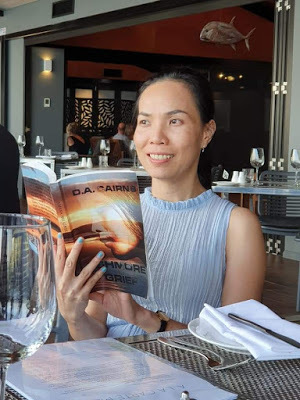
These words were penned some time in 2012 and later published in chapter 22 of my third novel, Ashmore Grief. The year of publication was 2013. I had never been to Darwin, nor did I imagine for a second that I ever would. Mostly set in Darwin, the novel was researched on the world wide web. The restaurant featured above, Pee Wee's at the Point, is one of Australia's top restaurants. I chose it as the setting for the important meeting in the narrative because of its prestige. I sent a copy of Ashmore Grief to the restaurant manager, as well as to television and radio personalities who I reasoned might be interested in this topical novel, and perhaps give it some much needed publicity. Despite the issue of asylum seekers entering Australia being a hot topic in 2013, and some favourable press, Ashmore Grief seemed destined for obscurity.
In 2016, I moved to Darwin to take up a new job and a commence a new chapter of my life. I never made it to Pee Wee's though, because it never seemed like the right time, and I didn't have the budget for it. (It actually isn't as expensive as imagined). It remained a dream of mine for many years: something I would do when the time was right and I had the right people with whom to celebrate.
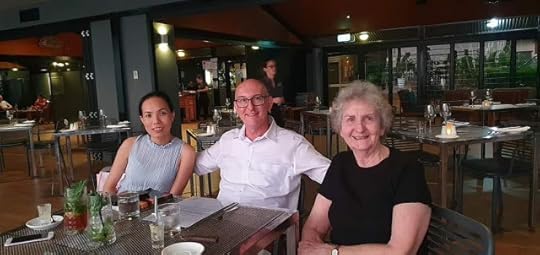
Last Thursday night, I finally dined at Pee Wee's at the Point, with my wife, two younger children and my mum who paid for the meal. Mum is her on her fourth visit to Darwin, and said on this occasion that she would like to take us out for a special dinner. I suggested Pee Wee's and the rest is now history.
The restaurant's service was exceptional and the food outstanding. I felt extremely relaxed and happy; it was quite dreamlike.
My plan was to take a copy of the book to the restaurant and take a few photos. Mum suggested I ask to see the manager, to tell them about my visit and the connection between Ashmore Grief and Pee Wee's at the Point. I went one further by reading the excerpt above to the manager who was quite happy with that. She requested a signed copy which I dropped off to her a couple of days later. At that time she requested a photo with me and the book.
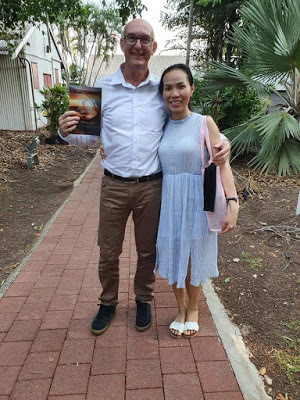
The total experience was mystical and wonderful, and whether it leads to anything or not, I will always treasure it. The new dream about me and Pee Wee's involves an elaborate launch of my 8th novel, Satan's Choppers (set again in the Top End.). I haven't even started writing the first draft yet, so that one is a way off. However, my first Pee Wee's dream took 7 years, and I'm a patient man, so stay tuned.
October 17, 2020
Snake Oil: Book reviews
What makes a good book review? Do you read reviews before you buy or read a particular book? Or do you read some reviews when you've finished reading the book? Maybe a little of both. Do book reviews influence your decision to purchase/read a book? Do you trust book reviews? Do you write reviews? Why or why not?
Despite predictions to the contrary, the book industry continues to thrive. Bricks and mortar book shops perhaps not, but there is no shortage of books being written, published, read and reviewed. In fact, in the 21st century, the digital publishing age, there are more books available than ever before. Many readers have switched to e-books only, but most use both paper and screens while only a few remain resistant to the use of technology.
Book reviews are coveted by writers as one of the most effective weapons in their marketing arsenal. This is not only because they are usually free, but because they are personal. Advertisers are always targeting you, even if you belong to a specific demography, they are still trying to sell something to you. It's the power of a personal invitation, a personal call to notice what is missing in your life and recognize from where, or from whom that need can be met. A book review is no different to any other sales pitch.
What makes a good review?
I've been a member and a reasonably active user of Goodreads since 2009. I've read and reviewed 328 books in that time. I also have an author page. I always try to keep my reviews quite short because I'm a fan of being succinct. I write like I shop. When I shop alone, I know what I want, I go and buy it and then I get out. When I write, I say what I have to say in as few words as I need to make my point, then I finish. Sometime earlier in the year, I taught a class called What a Novel Idea during which I taught my students how to write a good book review. I did some research and found a process which I thought was very simple and very effective. In fact, I still use this style.
I write a brief introduction to the review, and a description of the plot or subject matter.I write about the things I didn't like.I write about the things I did like.I write a closing sentence with a recommendation.Do you read book reviews?I never read reviews of books before I read the book. There are three reasons for this. Firstly, I'm afraid of spoilers, and secondly, I don't want a review to prejudice me. For example, if a review suggested there was a certain fault with the writing style of the author, I would read the book in detective mode. This would detract from my possible enjoyment of the book. Finally, I have a general suspicion of book reviews.
On the other hand, I often read some reviews after I finish because I'm interested in other people's opinions. I'm especially interested in hearing different perspectives on what I read. Themes I may have not considered, features of the story or the characters which I missed or didn't think relevant. Stuff like that.
Do you trust book reviews?
I think there are an impossible number of five star books on the market. If it looks like a duck and quacks like one, it's probably a duck. The preponderance of five star reviews looks and sounds like snake oil. I mentioned earlier that I've read and reviewed 328 books in the eleven years since I joined Goodreads. Among that number, less than 10% have received five star reviews. Three stars is a good read, a recommended read, a quality read in my opinion. Four stars is next level: now I'm impressed. It's a cut above. Five stars is the kind of book which frequently stopped me in my tracks, astounded by the brilliance of literary expression. Five stars means it made me feel something to the extent I actually laughed or cried. Or even felt anger or real suspense coupled with an elevated heart rate. Of the books below, only two received a 5 star review from me.
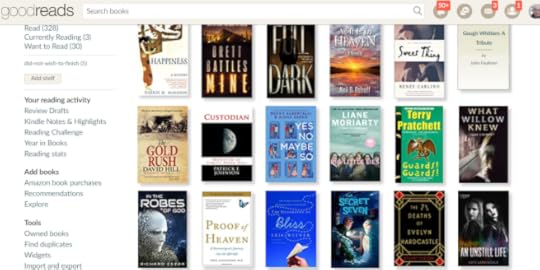
I could be simply a hard marker, or lots of people are super easily impressed, or...these reviews are rubbish. Snake Oil. Call me a cynic, but in the era of the e-book and POD publishing, competition for readers is fierce and five star reviews glitter like gold.
Do you write book reviews? Why or why not?
Especially for unknown writers like myself, I want to help, so I write general positive, but honest reviews for books I rate at three stars and above. If the book is not going to make the cut, I won't review it, but I will reach out to the author with some constructive criticism. If the author is famous or dead, or both, I don't feel the review has as much clout. Certainly not with the author and probably not with any of that author's fans. Neither a good review or a bad review is likely to be noticed. So why do it? Just to join the vox populi? Out of habit? Yes and yes, but also writing a review helps me to remember what I want to remember about that book.
I always ask people who buy my books to review them, but very, very few do. I guess by faithfully reviewing all the books I read, I'm making myself more comfortable with requesting others to do that for me. So now, you're wondering why I care when I said earlier in this post that I thought reviews were generally not trustworthy, and in my case had no impact at all on my decision to read a particular book or not. Again, it's probably my wave of making sure that when I criticize others for snake oil book reviews that I maintain my integrity by writing genuine ones.
How would you answer my opening salvo of questions? I'd love to hear your views.
October 9, 2020
The Mirror: Instant Drop in Standards
Back in 1984, my 15 year old friends and I went to see a film which legally we weren't supposed to be able to see. I was able to buy alcohol as well around that time thanks to looking older than I was, and the slackness of those who sold the grog. I live in Australia's Northern Territory and I need to show my ID every time I buy alcohol at a bottle shop. I'm pretty sure I look over eighteen now, but we have a banned drinkers register up here, so no ID, no booze. Late in '84, I'm pretty sure the person who sold me movie tickets to Scarface (rated R) didn't even look at me to see whether I was old enough, and they certainly didn't ask.
How did I feel about seeing a film with sex, nudity, very frequent coarse language, graphic violence, gore, and intense and frightening scenes? Let me just say, there's a reason such content is restricted to adults.
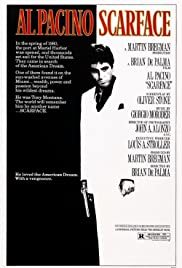
That was 36 years ago. Thirty six years. In the 1980's you never heard swear words on TV. There was no PG rating, but they had one called NRC (not recommended for children under 12), so films with a rating lower than M would generally have been considered okay for older children. There would not have been any course language or strong violence and certainly no nudity or sex, not even suggested or implied sex. TV was also very safe during prime time, generally speaking.
Of course, it's possible, I'm viewing the past through rose-coloured glasses, but I feel like there was a lot of safe, harmless viewing for children, even as recently as the late nineties and early 2000's when my older children were growing up.
I would have bet my life on a PG film being safe for my two younger children, now aged fourteen and eleven respectively. In fact, I tell them when it's their turn to choose, that anything PG is okay for us on family movie night. There's been a not of a blurring, a lowering of standards in my view, but it's been such a slow fade I wouldn't be able to pinpoint when it happened. At what point did someone say it was now okay to use the word "shit" multiple times throughout a PG rated film? When did nudity and strong sexual allusions become okay? Realistic violence? Did I miss something? There's no other way to describe it other than as a slow fade.
What brought this all to a head for me was last week's family movie. I'd previously considered this one, but baulked and, in it's place selected the pathetic Jack and the Beanstalk which I wrote about in a previous post. I hesitated and chose another film instead of Instant Family because of the advisory warning. These are good. These advisory warnings because they add detail to the rating. Okay, it's PG but why? What is it exactly that makes this family film not for general exhibition. Instant Family actually rated M today, but I swear it was PG on Saturday. Anyway, it's rated M with a content advisory saying its suitable for children aged 13 and over...which is what I thought PG was.

My point remains though, albeit minus my star attraction in the witness box. There are PG films with mild sex scenes, coarse language and medium level violence listed on Amazon Prime's ratings list. I reckon PG is no sex, no coarse language, and mild comedic violence only. But I'm swimming against the tide, I know that. When parents take their children to the cinemas to see M rated films, and they say that's okay because they are superhero films.
I admit to being conservative which may lead me to the continuation of this tiresome belly-ache. Rather than making clearer my already completely transparent views, I'll turn my attention to the film which started it all. It's ironic that it appears to have been my mistake which led me to having to try to explain 'dick pic' to my eleven year daughter. I chose an M rated film which contained frequent uses of 'shit'. And there were some fairly intense dramatic scenes and violence. You can see why I was shocked. And you can probably also see why I'm a little sheepish about my protest. Protest? Let's be honest, it was a rant; a baseless rant, (but not entirely baseless).
I'll be more careful next time.
Instant Family, by the way, is a terrific film. A highly recommended heart warmer.
September 28, 2020
A Dog's Eye: Centimetering closer
It's not even a word, you know. Centimetering. And to make it a word, I have to use the US spelling of metre which is meter, otherwise it reads as metring. This doesn't seem important. In fact, it seems I might be writing a blog post for the sake of it; without any real propulsion via innovative thought. That might be the case. I can certainly see how it might be perceived that way, but perhaps I'm trying to say something really profound. I usually do. At least I usually try to be thought provoking.

Okay, it's time to drop the pretense. On this occasion, I really don't have anything to say, so I'm using a writing technique which has always existed, but more recently become known as pantsing. Many of you will recall that in your school days pantsing was the act of pulling down another person's pants in order to embarrass them. Nowadays, this is considered sexual harassment. Pantsing in writing is the act, someone would say the 'art' of writing with no fixed plot or resolution in mind. In this context, the term itself was born from the expression to fly by the seat of your pants. Whether, I'm working a novel, a short story or a blog post, I don't usually pants it. However, on this occasion I am, but let me explain how I am going to tie these loose threads together.
There are times when life appears to move forward gently and uneventfully. This movement may be rapid, but it won't be perceived that way. There'll be no sense of the frantic, chaotic, full of surprises type of adventure. Things will seem relatively peaceful, not dull or devoid of activity, but steady and manageable. In my experience, it's not typical for life to meander. In my in between period, while I was waiting for my wife to be given permission to move to Australia, I was far less busy than I am now, but life still moved along quite steadily. I had less to do, and more time to do it. I wasn't necessarily anymore or less relaxed or peaceful. She and the children have been here for nine months now. Just like that. Life is much busier and time appears to be moving quickly, but not more or less quickly than it was before.

"Tempus fugit when you're having fun" is merely a matter of perception. If you concentrate, you can slow down and enjoy what might ordinarily be a blip on the radar of time. You can advance towards the future at a more comfortable and leisurely pace. When something progresses slowly, incrementally we say it inches forward. The problem with that saying is that it's a bit of an anachronism because we've been using the metric system in Australia since 1966.
So, I'll say life is centimetering forward because I choose it to do so. I don't wish away every moment of drudgery so I can get to the next thrill. I don't start work on Monday, gloomy, then proclaim the joy of Friday. Even when I am sick, as I am now, I'm careful not to wish the time away.
Time is one of the many areas impacting on our lives over which we have limited control. I can't create more of it. I have as much of it as I have which is the same as everyone: twenty four hours a day, seven days a week etc. I can make some things happen faster. For example, I can set my alarm and wake up earlier, then brush my teeth faster, but I haven't created more time, I've simply created more space within the time I have to do something else. My attitude can also affect the perceived passage of time.
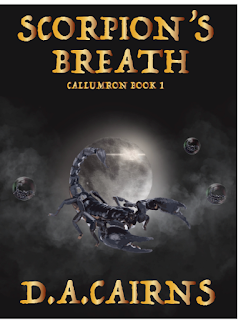
Scorpion's Breath will be released in December. I'm slowly working on the sequel, The Sorcerer's Tusk. I had to shelve plans to publish I Used to be an Animal Lover which I thought, and still think is a great idea, but nobody else did and without any money, I can't proceed with self publishing. I've been waiting over 20 years now to make it as an author, but I'm still wandering around in the forest of obscurity. You might say my writing career is centimetering forward, but you might just as easily suggest to say so would be an exaggeration.
There you go, seven hundred and thirty eight words written by the seat of my pants. I hope you don't feel that reading them was a waste of your time.
September 11, 2020
The Mirror: Indifferent Beanstalks
Here's a quote from someone who I directed to check out one of my books: "I just read the blurb and it filled me with indifference."
Here's a quote from me after discovering a movie which I thought might be a suitable choice for our family movie last Saturday. "I just read the blurb and it filled me with indifference."
One of the above quotes is genuine, the other is an attempt at humourous mimicry.
I watched Jack and the Beanstalk (2009) in spite of my better judgement; a little voice whispering against choosing it. I heard words like 'been done before', 'no A grade cast members' and 'little chance of this being even good let alone great.' Yet, I watched it and to be fair, it had some good moments. Sadly, it had a lot more bad moments, mostly relating to the writing which was so hit and miss it instigated a bout of motion sickness. Christopher Lloyd and Chevy Chase were in the supporting cast but only because they needed some cash and were between real jobs. There was an overall pall of amateurishness.
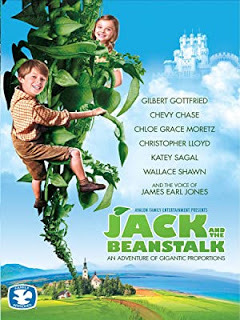
That last sentence possibly helps explain why I didn't like Jack and the Beanstalk. It also offers a potentially valid reason why the man who read the blurb for my best novel to date (in my opinion), had the temerity to be honest about his level of interest in reading it. Although he started off saying he didn't like reading romance in any form, I was ridiculously overconfident about the power of Love Sick Love's blurb-did I mention it is without doubt my best literary work so far?
What is of most interest here, as I wind my way with painful sloth towards the point of this post, is that I ignored my indifference and watched the film. I decided to give it a crack. My Twitter mate was not willing to go there, and as someone I know often likes to say, that is the problem.
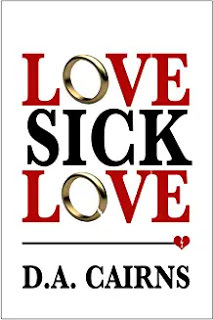
In my endeavour to sell my work, I have a lot of competition. What is my point of difference? How do I raise my voice above the noise of the crowd? How do I stand out on the canvas of life? Even having a quality product does not ensure success. The cream does not always rise to the top.
I suspect most people aren't like me. They will judge a book by its cover and not read it, or if the cover works and carries them to the back of the book where lies the blurb, they may still pull out of the deal if said blurb leaves them feeling indifferent. Furthermore, if they buy or borrow the book there is no guarantee they will finish it. Finally, once they've read the book they won't write a review. They may not even tell anyone about it unless it was outstanding.
Since joining Goodreads six or seven years ago, I've read and reviewed 326 books. On only five occasions have I decided to give up and not finish a book I had started. I review every book I finish reading. I ask people who finish reading my books to review them, but very few do. Even when it was a condition of several giveaways which I have run on Goodreads, people still don't review. I'd settle for mediocre or even bad reviews if only people would talk about my books.
If only every one was like me. I make connections with authors on Twitter and buy their books, then review them. I've done that on a number of occasions, hoping for reciprocation, or at least a thank you...hoping in vain. I share people's posts, help promote their businesses and their causes. For many of my friends on Facebook, it's one way traffic. I must be mad to expect so much of people.
There's too much to do, too much to know, too much to share, too many books, too many movies and TV shows, too many variations of the same product on our supermarket shelves. There are too many re makes, too much re branding, too little innovation. If I gave you three magic beans in change for your cow what would you do with those beans. There just aren't enough Jacks in this world. Most of us are too comfortable with what we have, and either too lazy or too scared to try new things. Indifference. Apathy. Let's plant those beans and ride that towering beanstalk to the great unknown. Read a book by an author you've never heard of. Write a book review and post it on Amazon. Support a cause just because someone asks you too.
August 29, 2020
A Dog's Eye: Seekers V Truth Seekers
 There are some people who seek truth and some people who just seek. I want to examine this profound quote of mine by writing about two men from completely different worlds. One is living while the other is long dead. One is a very famous philosopher; the other a moderately famous philosopher. The former was a writer of books, the latter is a writer of songs. Both men thought very deeply and reflectively on life-origins, purpose and endings-before they put pen to paper.
There are some people who seek truth and some people who just seek. I want to examine this profound quote of mine by writing about two men from completely different worlds. One is living while the other is long dead. One is a very famous philosopher; the other a moderately famous philosopher. The former was a writer of books, the latter is a writer of songs. Both men thought very deeply and reflectively on life-origins, purpose and endings-before they put pen to paper. Here is just one sample of the lyrics from a song written and performed by American metal core band, As I Lay Dying of which one of our two men, Tim Lambesis, is the front man.
"Paralyzed"
What is certain I have ignoredI have spent most of my lifeTrying to complicate everything that I believeSo that while paralyzedIn thought I will always have an alibiJust another excuse (just another excuse)To hesitate (to hesitate)Delaying true progress with passivity
The answers that I've foundAre all the sameThey uncover questionsThat still remain.
 The other man, who lived in the 4th century, is
Saint Augustine.
His mother was a Christian but he dismissed her faith as a crutch for simpletons. He then began a search for higher happiness via the medium of education, investigating the philosophical teachings of Aristotle and Plato and those who followed, to re interpret or re imagine what had already become the chief pursuit of man: happiness. One of the key questions was whether happiness should even be a goal of life, and if so, was it possible to achieve?
The other man, who lived in the 4th century, is
Saint Augustine.
His mother was a Christian but he dismissed her faith as a crutch for simpletons. He then began a search for higher happiness via the medium of education, investigating the philosophical teachings of Aristotle and Plato and those who followed, to re interpret or re imagine what had already become the chief pursuit of man: happiness. One of the key questions was whether happiness should even be a goal of life, and if so, was it possible to achieve?Most people nowadays will honestly and easily tell you that one of the main purposes of this thing we call life is happiness. You will no doubt have heard someone, perhaps many people, say as an addendum to a conversation about choices and consequences 'as long as you are happy.'
Augustine searched everywhere for the elusive key to happiness-the meaning of life, if you prefer. In the end, like Solomon he found nothing truly worthy of his attention. Every thing was vanity and chasing after the wind. Naturally this discovery made both men miserable. Augustine ultimately returned to his faith and wrote his most famous book, The City of God, in which he very clear outlines the case for why the earthly quest for happiness is an exercise in futility. The lasting influence of Augustine on the universal Christian church cannot be overstated. At age 76, he died a champion of the Christian faith and remains so to this day.
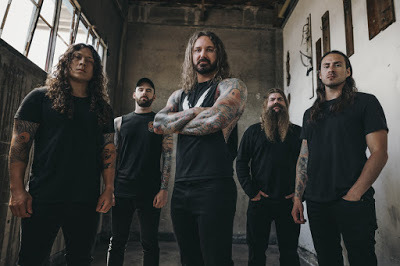 As I lay Dying
frontman, Tim Lambesis seems to have been on a journey himself, and this is most clearly seen in his very honest and introspective lyrics. His struggles with faith resulted in him abandoning his belief in God, and hiring someone to kill his wife after their marriage broke down. The hit did not occur, but Lambesis,was arrested and charged with conspiracy to murder. He was later convicted and spent six years in prison, before rejoining his band and producing another high quality metal core album: Shaped by Fire. His current standing on matters of faith is unknown and entirely his own business.
As I lay Dying
frontman, Tim Lambesis seems to have been on a journey himself, and this is most clearly seen in his very honest and introspective lyrics. His struggles with faith resulted in him abandoning his belief in God, and hiring someone to kill his wife after their marriage broke down. The hit did not occur, but Lambesis,was arrested and charged with conspiracy to murder. He was later convicted and spent six years in prison, before rejoining his band and producing another high quality metal core album: Shaped by Fire. His current standing on matters of faith is unknown and entirely his own business.For most people the search for happiness as the ultimate goal and purpose of life results in disappointment, at best, or devastation at worst. Although, the search for happiness is doomed to failure, still we pursue it. Everyone searches for meaning in life, for happiness to help ease the inevitable pain, but not all of these seekers find what they are looking for.
When Jesus said that those who seek would find what they were looking for, he wasn't talking about happiness. What are you looking for? And what kind of seeker are you?
August 15, 2020
A Dog's Eye: L plates
 L plates are squares of magnetic vinyl or plastic which are put on cars and other motor vehicles to indicate the driver of that vehicle is learning to drive. It is a legal requirement for the L plates to be displayed on both the front and rear of the vehicle. Except for motorbikes, the learner driver must also be accompanied by, and supervised by a fully licensed driver.
L plates are squares of magnetic vinyl or plastic which are put on cars and other motor vehicles to indicate the driver of that vehicle is learning to drive. It is a legal requirement for the L plates to be displayed on both the front and rear of the vehicle. Except for motorbikes, the learner driver must also be accompanied by, and supervised by a fully licensed driver.Exhaustive research* into the effectiveness of L plates for learner drivers has shown two things to be inarguably true.
L plates have zero impact on the learner driver.L plates, despite the intention of law makers, have minimal impact on the behaviour of other drivers.L plates should be worn by adults, irrespective of whether they are driving a vehicle or not. In one sense, everyone is a work in progress. Nobody's perfect is a cliched often used by those who make mistakes or those who overlook the mistakes of others. However, cliches become cliches because they contain truth and hence are often repeated. Everyone makes mistakes.
Mistakes may have one of two primary causes: carelessness or recklessness. Carelessness implies a lack of forethought to the potential consequences of one's word or actions. Recklessness suggests the consequences may have been considered but not seriously. Reckless people often believe they are immune from normal outcomes. There will be some degree of selfishness involved in decision making. A reckless person may predict possible negative consequences, but will decide the potential benefit to themselves outweighs the danger.
The next level in this progression is the heartless person who deliberately chooses to hurt people. Calling such harmful actions 'mistakes' would be a ridiculous understatement.
How do we live? How do we fit in? How do we get on in the world? How do we achieve contentment and live peaceable and productive lives? L plates please, while we figure it out. L plates for those who are still learning life lessons. Do I mean all of us? Or am I perhaps referring to special cases? Particular circumstances which may have happened to me recently?
My wife is learning to drive a car in Australia. She's an experienced and quite skillful motorcyclist who's used to driving on the right hand side of the road. Controlling speed and acceleration with her foot is something she is still familiarising herself with. We may have ventured into traffic a little prematurely. My wife may not have been ready for what she encountered in her first few driving 'lessons.' This may have been a mistake on the part of her instructor, and I may be that very person responsible for pushing her a little hard.
 Nevertheless, there we were waiting to make a right hand turn from our street onto the main road. To cut a long story short we ended up stopped in the middle of the road, blocking cars coming from both directions. Immediately to the right of my wife was an angry driver. No harm had been done. We had simply delayed him, but he was going off his brain. If was difficult for my wife to shake off this experience and keep driving, but she did, because she's awesome.
Nevertheless, there we were waiting to make a right hand turn from our street onto the main road. To cut a long story short we ended up stopped in the middle of the road, blocking cars coming from both directions. Immediately to the right of my wife was an angry driver. No harm had been done. We had simply delayed him, but he was going off his brain. If was difficult for my wife to shake off this experience and keep driving, but she did, because she's awesome.The driver of the other car thought of nothing except the impact of the incident on himself. His anger and verbal abuse achieved nothing. No doubt he recounted the story to the next person he spoke with, and has probably retold the story many times since, with all manner of embellishment. He might often explode like that when people upset him, or we may have caught him on a bad day. However, the point is that uncontrolled expressions of rage are not uncommon. Moreover, such lack of self control is symptomatic of someone who is still learning how to manage their emotions.
Emotional intelligence is taught to children in schools nowadays, and so it should be, but teaching something -whatever it is- does not guarantee people are learning. We could wear L plates to indicate we are learning how to navigate some aspect of life or life in general, but that very action requires the kind of humility which is obviously absent in may people I encounter.
Despite all this philosophizing, it's possible the non L plate wearing driver who blew up at my L plate wearing wife is simply a tool: a rude, thoughtless and selfish man. Never mind. No one's perfect,
*I am not aware if any such research
August 9, 2020
Snake Oil: Two monumental lies
While these powerful, yet hidden lessons controlled me, I proclaimed my normalcy. It is not an unusual thing for a man to be careful with money, especially if he has a family to support. Saying no is a crucial sign of strength. It is also quite normal for a man to be frequently having inappropriate thoughts of a sexual nature, and even acting out these thoughts in some way. Saying yes is a crucial sign of strength. I learned these things from my father.
1. A man is not generous. He is stingy and controlling.
2. A woman is a thing for a man's pleasure. In sexual matters, a man does not deny himself, and women should accept that.
To be fair, Dad improved with age. he mellowed and became a better man. When he died, I lost one of my best friends. I still miss him and the great friendship we built over my lifetime, through many challenges. But dad taught me to be mean with money and to objectify women.
I believe I was in my forties when I read this verse in the Bible: "One gives freely, yet grows all the richer, another withholds what he should give and only suffers want." (Proverbs 11:24) I had considered myself a good steward of money, prudent and sensible, but upon reading this verse God told me I was stingy. I have been working on becoming more generous ever since.
In 2015 with my marriage over, partially as a result of infidelity on my part, I was sitting in church when an ad popped up on the big screen during the announcements segment. Upon hearing that this course, called Valiant Man, was about sexual discipleship, I felt God wanted me to do it. The course switched the lights on, exposing my slavery to the god of sex, and ever since I have been working on becoming a better man, a purer man, an honorable man who respects women.
One of the things I learned in the course was the value of emotional honesty and humility. Recognizing my behaviour in the arenas of
money and sex, I had to admit I was a long way short of where I wanted to be. I wanted to understand myself and I wanted to change. I wanted, and I still want truth to change me.
In the individualistic and hyper-eroticized West, money and sex have become weaponized commodities. The great lie is that this is okay. This is the lie I believed most of my life because my father lived it out in front of me. I swallowed the snake oil, but I didn't know any better, nor did he. Now I've spat it out and rejected the lie.
August 1, 2020
The Mirror: Becoming Better Men
Spiderman: Into the Spiderverse is an interesting spin on the the very popular Marvel superhero story. It explores the idea of parallel universes, each of which has its own Spiderman. The hero of our story is very briefly a second Spiderman in his universe, before stepping up into the main role and naturally, and humorously, disarming the super villain and saving the world.
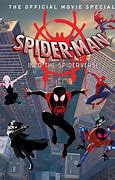 This is not a blog post about the human thirst for superheroes and gods. It's very easy to understand their popularity from the standpoint of us having been created by God with a natural appetite for the spiritual world, and more specifically for Him. This post is not about the messianic overtones present in just about every action film ever because the need for a saviour, like the need for a hero, is built into us. It's not about how frequently familiar superhero characters and tropes are rehashed, reworked and represented. For, as Solomon once said, there is nothing new under the sun. This post is not even about the movie which was very funny and entertaining. It certainly is not about how the Blogger interface has been changed since last time I used it; leaving me displeased.
This is not a blog post about the human thirst for superheroes and gods. It's very easy to understand their popularity from the standpoint of us having been created by God with a natural appetite for the spiritual world, and more specifically for Him. This post is not about the messianic overtones present in just about every action film ever because the need for a saviour, like the need for a hero, is built into us. It's not about how frequently familiar superhero characters and tropes are rehashed, reworked and represented. For, as Solomon once said, there is nothing new under the sun. This post is not even about the movie which was very funny and entertaining. It certainly is not about how the Blogger interface has been changed since last time I used it; leaving me displeased. This is a post about men becoming better men.
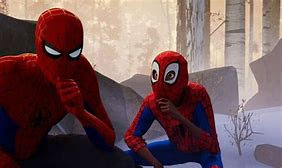 In the film, Miles labours under the weight of expectation of his parents, particularly his father. Dislocated from his neighbourhood, his school and his friends, he feels a little lost. He feels he should try harder, do better, be better. These feelings of inadequacy are exacerbated after he is bitten by a radioactive spider, then meets Spiderman.
In the film, Miles labours under the weight of expectation of his parents, particularly his father. Dislocated from his neighbourhood, his school and his friends, he feels a little lost. He feels he should try harder, do better, be better. These feelings of inadequacy are exacerbated after he is bitten by a radioactive spider, then meets Spiderman.The desire to be better is partially inherent, and partially learned. Many factors come into play, but most men will, at some time in their lives, feel as though they are underperforming. They will know the shame of disappointing people they love. They will become ensnared by the desire to cover over what is wrong while they attempt to make it right.
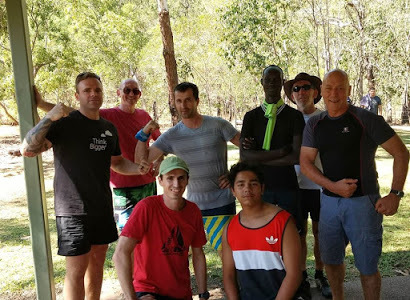 Last weekend was a long weekend in Darwin. Forty two men from my church headed into the bush for men's camp. The theme of the weekend was 'becoming better men'. We ate together, watched a movie under the stars, heard some great teaching and participated in an afternoon of very challenging physical activity.
Last weekend was a long weekend in Darwin. Forty two men from my church headed into the bush for men's camp. The theme of the weekend was 'becoming better men'. We ate together, watched a movie under the stars, heard some great teaching and participated in an afternoon of very challenging physical activity.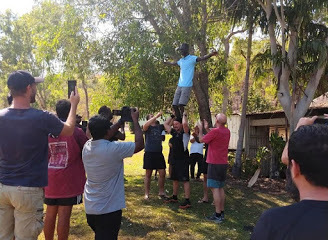 All of us want to be better men, but we are neither gods, saviours or superheroes. We are humans who acknowledge our own weaknesses, and don't pretend to be anything other than what we are. This is humility. We also recognise our strengths and find ways to use them to help other people. One of the key ideas underpinning the camp was that men who want to be better men, need other men who also want to be better men. If you lie down with dogs you get flees. Pauls puts it a little more eloquently, but no less forcefully, in his first letter to the Corinthians: 'bad company corrupts good character.'
All of us want to be better men, but we are neither gods, saviours or superheroes. We are humans who acknowledge our own weaknesses, and don't pretend to be anything other than what we are. This is humility. We also recognise our strengths and find ways to use them to help other people. One of the key ideas underpinning the camp was that men who want to be better men, need other men who also want to be better men. If you lie down with dogs you get flees. Pauls puts it a little more eloquently, but no less forcefully, in his first letter to the Corinthians: 'bad company corrupts good character.'Interestingly, the major take way for me from Superman: Into the Spiderverse was that Miles (young Hispanic Spiderman) needed the other Spiderpeople (include two females and a cartoon pig) to save the world. Spiderman is usually, a lone hero, but in this film it was very much a team effort.
I'll say it again, men who want to be better men, need to spend quality time with other men who want to be better men. This was the message of the movie and of the camp.
July 18, 2020
A Dog's Eye: Bibliophilia
 Ironically, I was talking about books with too many unknown words being hard to read and therefore
Ironically, I was talking about books with too many unknown words being hard to read and therefore not being read. In other words, some readers pick them up because they're interested in the cover, the title or maybe the blurb. Unfortunately, they usually don't continue reading for very long if they find it too hard. Lexical density is one issue, but a preponderance of complex sentences and grammatical variations used by the author for stylistic purposes can also contribute to such a book being put down by some readers. (for example: the sentence you just read.)
I've advised people, specifically non-native speakers of English and children, not to read books which are too hard in this sense. I said it was ironic because I write such books. If you are unfamiliar with my work, I mostly write neo-classical contemporary literary fiction. Damn! I did it again. What is neo-classical contemporary fiction? The answer to that question is not important.* I've made my point sufficiently well in these first two paragraphs to change tact.
This change of tact (or is it tack?) is made possible because I can write. I can change literary gears as easily as breathing. I can choose common words just as easily as rare ones. I can write simple, compound or complex sentences, and blend them perfectly. I can choose formal or informal language, I can say the same thing in a number of different ways, and I'm wickedly adept at metaphor. This isn't boasting. I'm not blowing my own trumpet. Most writers can do exactly what I do and many can do it way better than me.
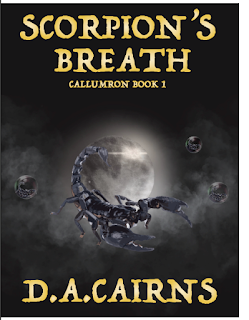 Anyway, this post was intended to be a long overdue update on my writing.
Love Sick Love
was published in 2017. In my mind it stands head and shoulders above all my other novels, but a new book is overdue. I always intended to release a book a year; one every two years at most. I'm happy to report the wait is nearly over. Scorpion's Breath is scheduled for release by Rogue Phoenix Press in December. It is the first book in a planned trilogy called the Callumron series. Book Two, titled The Sorcerer's Tusk, is under construction and will hopefully be released next year; to be followed in 2022 by Book Three: Satan's Choppers. At some point over the next couple of years I will begin work on the first draft of my most ambitious novel to date. I love historical fiction, but I've never written an historical fiction novel, so I'm going to do it. The working title for this book, which will be set on the Australian Goldfields during the rush of the early to mid 1850's, is Holy Ground.
Anyway, this post was intended to be a long overdue update on my writing.
Love Sick Love
was published in 2017. In my mind it stands head and shoulders above all my other novels, but a new book is overdue. I always intended to release a book a year; one every two years at most. I'm happy to report the wait is nearly over. Scorpion's Breath is scheduled for release by Rogue Phoenix Press in December. It is the first book in a planned trilogy called the Callumron series. Book Two, titled The Sorcerer's Tusk, is under construction and will hopefully be released next year; to be followed in 2022 by Book Three: Satan's Choppers. At some point over the next couple of years I will begin work on the first draft of my most ambitious novel to date. I love historical fiction, but I've never written an historical fiction novel, so I'm going to do it. The working title for this book, which will be set on the Australian Goldfields during the rush of the early to mid 1850's, is Holy Ground.In the meantime, during my house sitting days, I wrote a non fiction manuscript called I Used to be an Animal Lover which has the awesome subtitle: a superficial and unscientific zoological memoir. Sadly, I haven't been able to find a publisher for this manuscript. I suspect it is due to the original presentation which was a 100K word multi genre experiment. Feedback from beta readers and editors who have provided sample edits for me in the hopes of securing the gig, suggest it doesn't work in that format. I Used to be an Animal Lover version 2 is now two books. One a memoir and the other an anthology of short fiction. I have enough information and confidence to do what I said I never would. I have just about lined up all my ducks; editor, cover artist and book producer. I'm almost ready to self publish.
There's just one problem. I don't have any money.
However, this is only a problem of perspective. If I don't have the money to publish I Used to be an Animal Lover now, then so be it. If I am never able to do it, so be it. I'll keep writing, and whether I can publish or get published, or once published sell any books, it's okay. It's not the end of the world. I feel okay. I feel safe, and I feel content enough to not be driven mad by the inevitable frustration which results for people who want everything they want...and right now please. Patience is a fruit of the Holy Spirit. I'm finding the more I relax inside God's providence, the less I struggle and the more I accept what I cannot change, the more peaceful I feel, and the more patient I become.
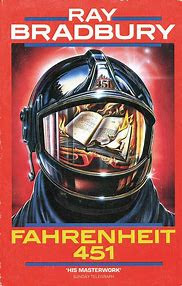 Lastly, I recently sold my short story, A Place of Refuge, for the fourth time. Guess what I did with the money I earned? I bought some books, and some clothes-but who cares about clothes? The books I purchased have been on my Goodreads 'to read' list for quite some time, so I'm very much looking forward to reading them, reviewing them and replacing them on the list with new books of interest.
Lastly, I recently sold my short story, A Place of Refuge, for the fourth time. Guess what I did with the money I earned? I bought some books, and some clothes-but who cares about clothes? The books I purchased have been on my Goodreads 'to read' list for quite some time, so I'm very much looking forward to reading them, reviewing them and replacing them on the list with new books of interest.Where would I be without reading and writing? In a darker, less interesting, less inspiring place where ignorance usurps enlightenment. A place where imagination, creativity, knowledge and wisdom are buried beneath mediocrity, apathy and blindness. A place such as described by Bradbury in his famous 1953 dystopian novel Fahrenheit 451 in which bibilophilia is considered a disease. The owning and reading of books is a threat to society, resulting in the seizure and burning of books .
Thankfully, I don't live in such a place. I am free to enjoy reading and writing whatever I want, whenever I want. Thank God for that. What are you reading or writing? What would you like to read or write?



